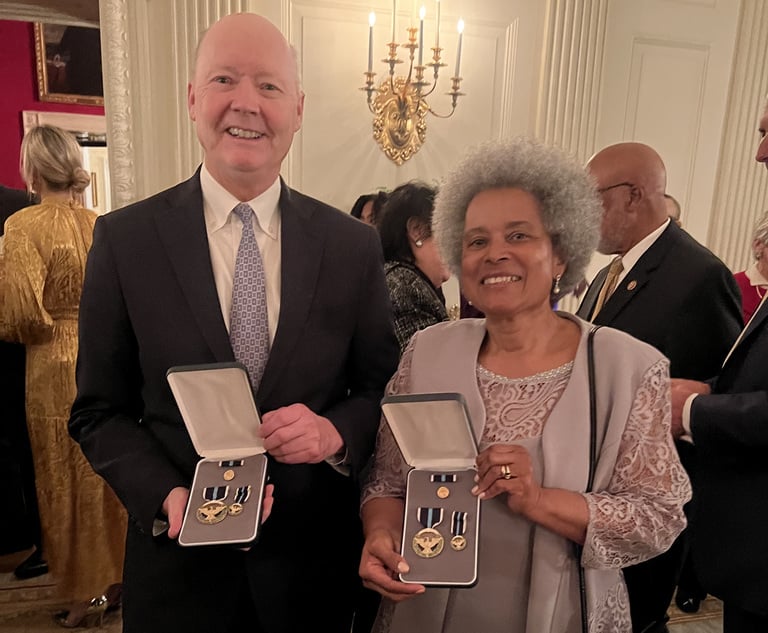CEO Resigns in Wake of Court's Finding of Fraud in $115M Sale of Payment Processing Co.
Isreali-based media firm Taptica International Ltd said late Monday that Hagai Tal was resigning after Vice Chancellor Sam Glasscock III in his opinion found that the executive had hidden key information from buyer Great Hill Equity Partners in order to position himself as chief executive of post-merger company BlueSnap Inc.
December 04, 2018 at 05:13 PM
4 minute read
 Vice Chancellor Sam Glasscock III
Vice Chancellor Sam Glasscock III
A Delaware Chancery Court judge's finding that the former CEO of payment-processing company Plimus Inc. had defrauded a private equity firm in the run-up to its $115 million sale in 2011 has led to the executive's resignation from the company he had been leading.
Isreali-based media firm Taptica International Ltd said late Monday that Hagai Tal was resigning after Vice Chancellor Sam Glasscock III in his opinion found that the executive had hidden key information from buyer Great Hill Equity Partners in order to position himself as chief executive of post-merger company BlueSnap Inc.
In a regulatory filing with the London Stock Exchange, Taptica, which is not connected to Plimus, said that Tal had tendered his resignation, and the board was deciding how to act. Glasscock had said in a 153-page post-trial ruling that Tal stood to personally benefit from the merger's completion and that his misrepresentations were material to the deal.
“Tal wanted the merger to go forward, as it had advantages for him personally—he could become CEO of a better-capitalized company and would personally benefit from the earn-outs and the liquidity that he would realize from the sale,” Glasscock wrote.
The decision did not address damages, though Glasscock said Great Hill and BlueSnap would be able to seek capped indemnification stemming from the fraud.
An attorney for Tal declined to comment Tuesday afternoon.
Taptica said in its filing that the plaintiffs “are entitled to restitution for breaches of certain representations and warranties.”
Great Hill and BlueSnap sued Tal and other executives in September 2011, about one year after the deal closed, alleging breaches of representations, fraud and aiding and betting in connection with the sale. In its complaint, Great Hill argued that Tal and his co-defendants knew that Plimus was on the verge of losing a second major payment processor that was central to its business model but failed to disclose that information as Great Hill did its due diligence.
PayPal eventually cut ties with Plimus after the deal was finalized, citing excessive “chargebacks” that were being passed along to banks for subpar products Plimus was selling to consumers. According to court documents, PayPal made numerous threats to end its relationship with Plimus in the two months leading up to the merger, though those concerns never reached Great Hill.
On Monday, Glasscock said that only Tal was involved in making the misrepresentations, and no other Plimus executives were implicated in the scheme. In his opinion, Glasscock said Tal told Irit Segal Itshayek, Plimus' vice president of financial strategy and payment solutions, early September 2011 that he would disclose the issues to Great Hill but never did.
“Given Tal's assurance, Itshayek had no reason to believe that, to the contrary, these facts would be withheld from Great Hill. For this reason, Itshayek cannot be charged with knowledge that Tal ultimately did not make the necessary disclosures,” Glasscock said.
Around that time, Plimus was facing similar pressure from Paymentech, LLC, one of the company's other processors, which terminated its relationship with Plimus earlier in the year. Great Hill accused Tal, Itshayek and a unit of Pennsylvania-based investor Susquehanna Growth Equity, LLC of removing key details from a disclosure schedule that accompanied the initial merger agreement.
Glasscock found that the defendants were recklessly indifferent to the omission, but ruled the misrepresentations to be immaterial in the context of the deal.
Great Hill, however, had justifiably relied on Tal's statements regarding PayPal, and Glasscock said damages would be determined following further proceedings. Under the terms of the merger agreement, Glasscock said Great Hill was entitled to indemnification based on the breaches, but the ultimate amount would be limited to funds that the companies had already set aside in escrow.
Gregory V. Varallo, who represented Great Hill and BlueSnap, said he was “pleased with the court's finding that there was fraud with the Plimus transaction.”
The plaintiffs were represented by Varallo, Rudolf Koch and Robert L. Burns of Richards, Layton & Finger in Wilmington and Stephen D. Poss and Adam Slutsky of Goodwin Procter in Boston.
Tal was represented by Michael K. Coran, William T. Hill, Monica Clarke Platt and Gregory R. Sellers of Klehr Harrison Harvey Branzburg in Philadelphia and David S. Eagle and Sean M. Brennecke from the firm's Wilmington office.
The case is captioned Great Hill Equity Partners v. SIG Growth Equity Fund.
This content has been archived. It is available through our partners, LexisNexis® and Bloomberg Law.
To view this content, please continue to their sites.
Not a Lexis Subscriber?
Subscribe Now
Not a Bloomberg Law Subscriber?
Subscribe Now
NOT FOR REPRINT
© 2025 ALM Global, LLC, All Rights Reserved. Request academic re-use from www.copyright.com. All other uses, submit a request to [email protected]. For more information visit Asset & Logo Licensing.
You Might Like
View All
Here's What Corporate Litigators Expect Delaware Courts to Address in 2025
6 minute read
Tesla, Musk Appeal Chancery Compensation Case to Delaware Supreme Court
2 minute read
Fed Judiciary Panel Mulls Authority to Ban In-State Bar Admission Requirements

Delaware Legal Figures Who Played Key Roles in Ending School Segregation Honored With Presidential Citizens Medal
3 minute readTrending Stories
- 1Meta Hires Litigation Strategy Chief, Tapping King & Spalding Partner Who Was Senior DOJ Official in First Trump Term
- 2Courts Beginning to Set Standards for Evidence Relying upon Artificial Intelligence
- 3First-Degree Murder Charge May Not Fit Mangione Case
- 4Legal Tech's Predictions for Legal Ops & In-House in 2025
- 5SDNY US Attorney Damian Williams Lands at Paul Weiss
Who Got The Work
Michael G. Bongiorno, Andrew Scott Dulberg and Elizabeth E. Driscoll from Wilmer Cutler Pickering Hale and Dorr have stepped in to represent Symbotic Inc., an A.I.-enabled technology platform that focuses on increasing supply chain efficiency, and other defendants in a pending shareholder derivative lawsuit. The case, filed Oct. 2 in Massachusetts District Court by the Brown Law Firm on behalf of Stephen Austen, accuses certain officers and directors of misleading investors in regard to Symbotic's potential for margin growth by failing to disclose that the company was not equipped to timely deploy its systems or manage expenses through project delays. The case, assigned to U.S. District Judge Nathaniel M. Gorton, is 1:24-cv-12522, Austen v. Cohen et al.
Who Got The Work
Edmund Polubinski and Marie Killmond of Davis Polk & Wardwell have entered appearances for data platform software development company MongoDB and other defendants in a pending shareholder derivative lawsuit. The action, filed Oct. 7 in New York Southern District Court by the Brown Law Firm, accuses the company's directors and/or officers of falsely expressing confidence in the company’s restructuring of its sales incentive plan and downplaying the severity of decreases in its upfront commitments. The case is 1:24-cv-07594, Roy v. Ittycheria et al.
Who Got The Work
Amy O. Bruchs and Kurt F. Ellison of Michael Best & Friedrich have entered appearances for Epic Systems Corp. in a pending employment discrimination lawsuit. The suit was filed Sept. 7 in Wisconsin Western District Court by Levine Eisberner LLC and Siri & Glimstad on behalf of a project manager who claims that he was wrongfully terminated after applying for a religious exemption to the defendant's COVID-19 vaccine mandate. The case, assigned to U.S. Magistrate Judge Anita Marie Boor, is 3:24-cv-00630, Secker, Nathan v. Epic Systems Corporation.
Who Got The Work
David X. Sullivan, Thomas J. Finn and Gregory A. Hall from McCarter & English have entered appearances for Sunrun Installation Services in a pending civil rights lawsuit. The complaint was filed Sept. 4 in Connecticut District Court by attorney Robert M. Berke on behalf of former employee George Edward Steins, who was arrested and charged with employing an unregistered home improvement salesperson. The complaint alleges that had Sunrun informed the Connecticut Department of Consumer Protection that the plaintiff's employment had ended in 2017 and that he no longer held Sunrun's home improvement contractor license, he would not have been hit with charges, which were dismissed in May 2024. The case, assigned to U.S. District Judge Jeffrey A. Meyer, is 3:24-cv-01423, Steins v. Sunrun, Inc. et al.
Who Got The Work
Greenberg Traurig shareholder Joshua L. Raskin has entered an appearance for boohoo.com UK Ltd. in a pending patent infringement lawsuit. The suit, filed Sept. 3 in Texas Eastern District Court by Rozier Hardt McDonough on behalf of Alto Dynamics, asserts five patents related to an online shopping platform. The case, assigned to U.S. District Judge Rodney Gilstrap, is 2:24-cv-00719, Alto Dynamics, LLC v. boohoo.com UK Limited.
Featured Firms
Law Offices of Gary Martin Hays & Associates, P.C.
(470) 294-1674
Law Offices of Mark E. Salomone
(857) 444-6468
Smith & Hassler
(713) 739-1250






